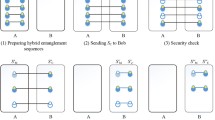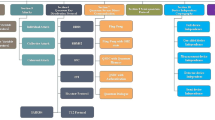Abstract
Recently, Yang and Hwang (Quantum Inf. Process. 13(3): 781–794, 19) proposed two fault-tolerant QKD protocols based on their proposed coding functions for resisting the collective noise, and their QKD protocols are free from Trojan horse attack without employing any specific detecting devices (e.g., photon number splitter (PNS) and wavelength filter). By using four-particle Greenberger-Horne-Zeilinger (GHZ) state and four-particle GHZ-like state in their proposed coding functions, Yang and Hwang’s QKD protocols can resist each kind of the collective noise–collective-dephasing noise, collective-rotation noise. However, their proposed coding function can be improved by the utilization of three-particle GHZ state (three-particle GHZ-like state) instead of four-particle GHZ state (four-particle GHZ-like state) that will eventually reduce the consumption of the qubits. As a result, this study proposed the improved version of Yang and Hwang’s coding functions to enhance the qubit efficiency of their schemes from 20 % to 22 %.
Similar content being viewed by others
References
Bennett, C.H., Brassard, G.: Quantum cryptography: Public key distribution and coin tossing. In: Proceedings of the IEEE International Conference on Computers, Systems and Signal Processing, pp 175–179, Bangalore (1984)
Bennett, C.H.: Quantum cryptography using any two nonorthogonal states. Phys. Rev. Lett. 68, 3121–3124 (1992)
Long, G.L., Liu, X.S.: Theoretically efficient high-capacity quantum-key-distribution scheme. Phys. Rev. A 65 (2002)
Ben-Or, M., Horodecki, M., Leung, D.W., Mayers, D., Oppenheim, J.: The universal composable security of quantum key distribution, vol. 3378 (2005)
Zhang, Z.J., Man, Z.X., Shi, S.H.: An efficient multiparty quantum key distribution scheme. Int. J. Quantum Inf. 3, 555–560 (2005)
Chen, P., Li, Y.S., Deng, F.G., Long, G.L.: Measuring-basis encrypted quantum key distribution with four-state systems. Commun. Theor. Phys. 47, 49–52 (2007)
Hwang, T., Lee, K.C., Li, C.M.: Provably secure three-party authenticated quantum key distribution protocols. IEEE Trans. Dependable Secure Comput. 4, 71–80 (2007)
Gao, G.: Quantum key distribution by comparing Bell states. Opt. Commun. 281, 876–879 (2008)
Yuan, H., Song, J., Han, L.F., Hou, K., Shi, S.H.: Improving the total efficiency of quantum key distribution by comparing Bell states. Opt. Commun. 281, 4803–4806 (2008)
Shih, H.C., Lee, K.C., Hwang, T.: New efficient three-party quantum key distribution protocols. IEEE J. Sel. Top. Quantum Electron. 15, 1602–1606 (2009)
Zhao, B.K., Sheng, Y.B., Deng, F.G., Zhang, F.S., Zhou, H.Y.: Stable and deterministic quantum key distribution based on differential phase shift. Int. J. Quantum Inf. 7, 739–745 (2009)
Hwang, T., Hwang, C.C., Tsai, C.W.: Quantum key distribution protocol using dense coding of three-qubit W state. Eur. Phys. J. D 61, 785–790 (2011)
Braunstein, S.L., Pirandola, S.: Side-channel-free quantum key distribution. Phys. Rev. Lett. 108 (2012)
Simon, D.S., Sergienko, A.V.: High-capacity quantum key distribution via hyperentangled degrees of freedom. New J. Phys. 16 (Jun 2014)
Boileau, J.C., Gottesman, D., Laflamme, R., Poulin, D., Spekkens, R.: Robust polarization-based quantum key distribution over a collective-noise channel. Phys. Rev. Lett. 92 (2004)
Xiu, X.-M., Dong, L., Gao, Y.-J., Chi, F.: Quantum key distribution protocols with six-photon states against collective noise. Opt. Commun. 282, 4171–4174 (2009)
Yang, C.-W., Hwang, T.: Fault tolerant quantum key distributions using entanglement swapping of GHZ states over collective-noise channels. Quantum Inf. Process. 12, 3207–3222 (2013)
Lai, H., Orgun, M.A., Xiao, J.H., Xue, L.Y.: Fault-tolerant high-capacity quantum key distribution over a collective-noise channel using extended unitary operations. Quantum Inf. Process. 13, 1523–1535 (2014)
Yang, C.W., Hwang, T.: Trojan horse attack free fault-tolerant quantum key distribution protocols. Quantum Inf. Process. 13, 781–794 (2014)
Zhou, H.-Y., Sheng, Y.-B., Deng, F.-G., Zhao, B.-K., LI, X.-H.: Fault tolerant quantum key distribution based on quantum dense coding with collective noise. Int. J. Quantum Inf. 07, 1479–1489 (2009)
Li, X.H., Deng, F.G., Zhou, H.Y.: Efficient quantum key distribution over a collective noise channel. Phys. Rev. A 78 (2008)
Xi-Han, L., Bao-Kui, Z., Yu-Bo, S., Fu-Guo, D., Hong-Yu, Z.: Fault tolerant quantum key distribution based on quantum dense coding with collective noise. Int. J. Quantum Inf. 7, 1479–1489 (2009)
Zanardi, P., Rasetti, M.: Noiseless quantum codes. Phys. Rev. Lett. 79, 3306–3309 (1997)
Walton, Z., Abouraddy, A., Sergienko, A., Saleh, B., Teich, M.: Decoherence-free subspaces in quantum key distribution. Phys. Rev. Lett. 91 (2003)
Li, C.-Y., Li, Y.-S.: Fault-tolerate quantum key distribution over a collective-noise channel. Int. J. Quantum Inf. 08, 1101–1109 (2010)
Cai, Q.Y.: Eavesdropping on the two-way quantum communication protocols with invisible photons. Phys. Lett. A 351, 23–25 (2006)
Deng, F.G., Li, X.H., Zhou, H.Y., Zhang, Z.J.: Improving the security of multiparty quantum secret sharing against Trojan horse attack. Phys. Rev. A 72 (2005)
Gao, F., Guo, F.Z., Wen, Q.Y., Zhu, F.C.: Comment on: Quantum key distribution for d-level systems with generalized Bell states. Phys. Rev. A 72 (2005)
Gao, F., Wen, Q.Y., Zhu, F.C.: Comment on: Quantum exam. Phys. Lett. A 350, 174 (2006). Phys. Lett. A 360, 748–750 (2007)
Li, X.H., Deng, F.G., Zhou, H.Y.: Improving the security of secure direct communication based on the secret transmitting order of particles. Phys. Rev. A 74 (2006)
Deng, F.G., Li, X.H., Zhou, H.Y., Zhang, Z.J.: Improving the security of multiparty quantum secret sharing against Trojan horse attack (vol 72, art no 044302, 2005). Phys. Rev. A 73 (2006)
Lin, J., Hwang, T.: Bell state entanglement swappings over collective noises and their applications on quantum cryptography. Quantum Inf. Process. 12, 1089–1107 (2013)
Acknowledgments
We would like to thank the Ministry of Science and Technology of the Republic of China, Taiwan, for partially supporting this research in finance under the Contract No. MOST 104-2221-E-006-102.
Author information
Authors and Affiliations
Corresponding author
Rights and permissions
About this article
Cite this article
Chang, CH., Yang, CW. & Hwang, T. Trojan Horse Attack Free Fault-Tolerant Quantum Key Distribution Protocols Using GHZ States. Int J Theor Phys 55, 3993–4004 (2016). https://doi.org/10.1007/s10773-016-3028-5
Received:
Accepted:
Published:
Issue Date:
DOI: https://doi.org/10.1007/s10773-016-3028-5




